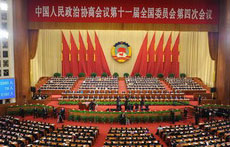16 pct cut in energy consumption per unit of GDP
(Xinhua)
Updated: 2011-03-05 12:07
BEIJING -?China aims to reduce energy consumption per unit of GDP by 16 percent in the five years to 2015, Premier Wen Jiabao said Saturday at the opening of the parliament's annual session.
Carbon dioxide emission is set to be slashed by 17 percent in the five years on the basis of 2010, as part of the country's "active efforts to grapple with climate change," Wen told nearly 3,000 deputies of the National People's Congress (NPC).
The reduction target will move China closer to achieve its pledge to cut carbon intensity by 40 to 45 percent by 2020, relative to 2005 levels.
In the five years to 2010, China achieved a 19.1 percent decrease in energy consumption per unit of GDP, Wen said in a government work report to be reviewed by the lawmakers, which was close to official target of a 20 percent cut,
According to the draft 12th Five-year Plan (2011-2015) for China's economic and social development, also released Saturday for reviewing, the proportion of non-fossil fuels in China's primary energy consumption should reach 11.4 percent by 2015, from 8.3 percent in 2010.
The government has pledged to increase the ratio to 15 percent by 2020.
Other targets for China to address climate change and pollution issues include a rise of forest stock by 600 million cubic meters and a rise of forest coverage to 21.66 percent by 2015, from 20.36 percent last year, Wen said.
The emission of major pollutants would be reduced by 8 to 10 percent in the 2011-2015 period, he said.
Those targets are parts of the government efforts to revamp its economy to a sustainable growth as the current model, relying heavy on massive consumption of fossil energy, has caused pollution and depletion of resources.
Wen said on February 27 that China would never exchange a high economic growth rate at the cost of harming the environment.
China should give a boost to the use of clean energy, such as nuclear power, and wind, solar and biomass energies in the following five years to trim dependency on coal, which contributes 70 percent of China's total energy consumption, Zhang Guobao, former head of the National Energy Administration, told Xinhua Friday.
The government would also cap total energy consumption at 4 billion tonnes of coal equivalent by 2015, an annual increase of 4.24 percent in the five years, he said. Last year, the country consumed 3.2 billion tonnes of coal equivalent, he added.
"The task of energy conservation and emission cuts is arduous", he said, noting "with determination, the goals can be achieved".



